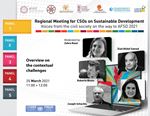Published on Thu, 2021-03-25 00:00
The video of the virtual Campaign Activation Workshop “Making the 2030 Agenda accountable: What is the role for civil society?” is now online. The virtual workshop was co-organized by Global Policy Forum, Global Policy Watch and Social Watch as part of the 2021 SDG Global Festival of Action and it was held on March 25, 2021. |
Published on Wed, 2021-03-24 12:03
Invitation to attend The Regional Meeting for CSOs on Sustainable Development in the Arab Region. Representatives of civil society and experts in Arab countries will discuss efforts to achieve sustainable development in the Arab region and the challenges it faces. The meeting will propose practical recommendations at the level of public policies to be submitted to the Arab Forum on Sustainable Development and through it to the High-level Political Forum to be held in July 2021 in New York. |
Published on Thu, 2021-03-18 11:02
The promise of the SDGs makes governments accountable but who is to be made responsible for global issues like the climate, the pandemic or finances? Join us to discuss this issue in a workshop hosted by Global Policy Forum, Global Policy Watch and Social Watch as part of the 2021 SDG Global Festival of Action. The workshop will be held on March 25, 2021 from 04:30 to 05:30 PM (CET). |
Published on Fri, 2021-02-19 14:13
The demands and urgency of addressing COVID-19 related issues have been added to the already crowded United Nations agenda, with consideration and intensity shifting up and down on the scale of priorities. |
Published on Thu, 2021-02-18 22:20
The United Nations and Member States begin the 2021 calendar confronted with the need to address the ongoing COVID-19 crisis and growing global inequalities. Despite the WHO’s efforts to make the COVID-19 vaccine “affordable and accessible for all” through the ACT Accelerator and calls by CSOs and UN leadership and world leaders for a People’s Vaccine (a global public good free from Intellectual Property Rights), the global vaccine distribution/rollout has been dominated by wealthy, developed countries, with little if any vaccines available for small and medium developing countries. |
SUSCRIBE TO OUR NEWSLETTER






